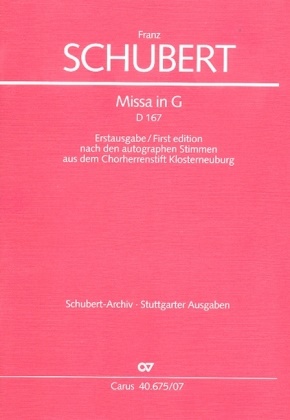Ulteriori informazioni
Franz Schubert's Mass in G major is one of the most popular settings of the mass ordinary: the charming song-like melodic writing, especially in the "Kyrie" and the "Credo", forms a magical counterpoint to more concertante passages in the "Gloria" and the "Sanctus". For a long time it was thought that Schubert's final version was scored for string orchestra alone, whilst a version with wind, brass, and timpani was thought to be an expanded orchestration by his brother Ferdinand Schubert. However, since the mid-1990s it has been known that the parts for trumpets and timpani were additionally composed by Franz Schubert himself for use "ad libitum". The present edition offers this "Klosterneuburg Version" - with trumpets and timpani ad libitum, but without Ferdinand's wind parts - in an Urtext edition reflecting Schubert's own intended orchestration.
Info autore
Franz Schubert gilt vielen Menschen als Inbegriff einer biedermeierlichen, beschaulichen Musikkultur. Seine berühmtesten Werke werden gern als Paradestücke für die Hausmusik des gehobenen Bürgertums angesehen. Doch das tradierte Bild des liebenswerten "Liederfürsten" verdient längst eine kritische Revision. Franz Schubert war eine höchst eigenwillige Persönlichkeit - und ein experimentierfreudiger, vielseitiger Künstler, in dessen Musik klassische Formprinzipien und romantische Ideen eine neue, unerhörte Synthese eingingen.
Riassunto
Franz Schubert's Mass in G major is one of the most popular settings of the mass ordinary: the charming song-like melodic writing, especially in the "Kyrie" and the "Credo", forms a magical counterpoint to more concertante passages in the "Gloria" and the "Sanctus". For a long time it was thought that Schubert's final version was scored for string orchestra alone, whilst a version with wind, brass, and timpani was thought to be an expanded orchestration by his brother Ferdinand Schubert. However, since the mid-1990s it has been known that the parts for trumpets and timpani were additionally composed by Franz Schubert himself for use "ad libitum". The present edition offers this "Klosterneuburg Version" - with trumpets and timpani ad libitum, but without Ferdinand's wind parts - in an Urtext edition reflecting Schubert's own intended orchestration.

